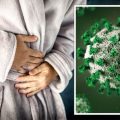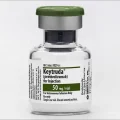NHS green light for eczema pill that can clear skin in a week

NHS green light for eczema pill that can clear skin in a week and provide relief for millions of Britons
- Some six million Britons suffer from Eczema, also called atopic dermatitis
- New drugs have been developed for those unresponsive to standard methods
- Dr Padma Mohandas said while eczema is common it can by tricky to treat
- Dr Mohandas described the new eczema treatments as ‘life-changing’
Three new medications that can fight severe eczema have been given the green light for NHS use.
The drugs will be offered to patients who don’t respond to standard treatments or have to quit them due to side effects.
Experts say the new treatments – abrocitinib, upadacitinib and tralokinumab – have an almost immediate impact on symptoms.
Dr Padma Mohandas, a consultant dermatologist at Barts Health NHS Trust in London, said: ‘Eczema is a common problem but in some cases it’s not easy to treat. In the worst cases it’s a debilitating disease that leaves patients feeling embarrassed, socially isolated and, in extreme circumstances, suicidal.

Jack Ransom, 27, from South London, had suffered from atopic eczema since he was three months old. Throughout his childhood he lived with dry, cracked skin covering 90 per cent of his body

Eczema, also called atopic dermatitis, affects more than six million people in the UK
‘With these new drugs we can offer them hope that their skin will get better, which is life-changing.’
Eczema, also called atopic dermatitis, affects more than six million people in the UK.
The condition causes areas of skin to become dry, itchy and prone to cracking and bleeding. It’s not fully understand what causes it, but the immune system is thought to mistakenly attack the skin.
Triggers include changes in temperature, exposure to sunlight and irritation from products like suncream, fabric condition and certain clothes.
Often appearing on the hands, inner elbows, knees and face, eczema is usually hereditary and there is no cure. Some people have small patches of dry skin, but others may experience it all over the body. First-line treatments include moisturisers and creams, but for many these are ineffective and stronger medications are needed, such as methotrexate and ciclosporin which inhibit inflammatory cells in the body.
These are effective, but by targeting the immune system as a whole they leave patients vulnerable to severe infections. Other side effects include irreversible kidney damage, raised blood pressure and reduced liver function.
The new drugs are approved for patients over 12 who have moderate to severe atopic dermatitis, meaning that ten per cent or more of the body is affected.
Abrocitinib and upadacitinib are known as JAK inhibitors. These stop the immune system attacking the skin by blocking enzymes called janus kinases that help to activate the immune response.
Tralokinumab is a monoclonal antibody drug which blocks the activity of proteins called interleukin-4 and interleukin-13 that trigger inflammation in the body.
Jack Ransom, 27, from South London, had suffered from atopic eczema since he was three months old. Throughout his childhood he lived with dry, cracked skin covering 90 per cent of his body. At the time, the only treatments he was offered were steroid creams and moisturisers.
Although the physical effects were uncomfortable, causing him to itch constantly, the hardest part was the psychological side. He says: ‘If you’ve got really cracked, flaky and puffy skin, particularly on your face, it has a big impact on meeting new people. It dictated what clothes I could wear as I would bleed through white shirts at school if I scratched too much.
‘I would miss certain social events as it would make me feel unattractive – you don’t want to date somebody who is red, itchy and puffy.’
In 2019, after a big flare-up of his eczema, Jack signed up for a trial of tralokinumab at Oxford University Hospitals NHS Foundation Trust. Within 24 hours the itching that had plagued him since childhood went away. And within a week of taking the daily tablets, a lot of his skin had cleared.
He says: ‘I used to have to moisturise six to seven times a day, and I’d take a sack full of creams with me wherever I went. Now I just moisturise in the morning and in the evening.
‘Most people I’m around don’t know I ever suffered from atopic dermatitis as my cracked skin has pretty much gone. In social situations it’s made a big difference and made me a lot more confident.’
Although the drugs have made him more prone to certain skin infections, including cysts, he adds: ‘It’s never made me regret taking the drug. I’m really glad more people can now access it as it has made a massive difference to my life.’
Source: Read Full Article




